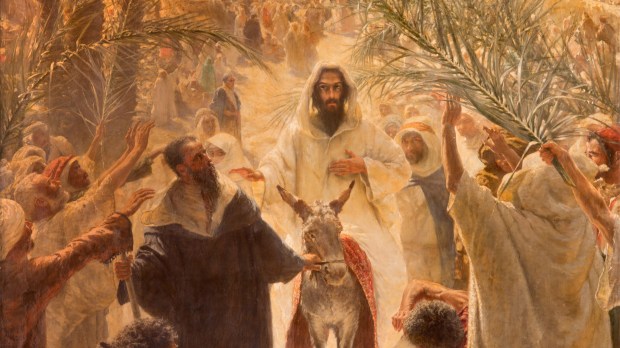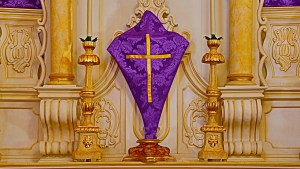Each year we begin Holy Week with the story of Jesus riding a donkey on Palm Sunday. To some it can be confusing, as it doesn’t seem to make sense why Jesus — who walked everywhere during his ministry — would make such an odd public choice.
Why did Jesus ride a donkey on Palm Sunday?
The primary reason why Jesus rode a donkey on Palm Sunday was to recall the prophecy of Zechariah regarding the Messiah.
Rejoice greatly, O daughter of Zion!
Zechariah 9:9
Shout aloud, O daughter of Jerusalem!
Lo, your king comes to you;
triumphant and victorious is he,
humble and riding on an ass,
on a colt the foal of an ass.
It was a very deliberate act that the people of Jerusalem would have recognized.
Furthermore, Jesus was highlighting what kind of king he was, as Pope Benedict XVI explains in his 2006 homily on Palm Sunday.
It should be remembered, John said, that in the Book of the Prophet Zechariah we read: “Fear not, daughter of Zion; behold, your king is coming, sitting on the colt of an ass” (Jn 12: 15; cf. Zec 9: 9). To understand the significance of the prophecy and, consequently, of Jesus’ behavior, we must listen to the whole of Zechariah’s text, which continues thus: “He shall banish the chariot from Ephraim, and the horse from Jerusalem; the warrior’s bow shall be banished, and he shall proclaim peace to the nations. His dominion will be from sea to sea, and from the river to the ends of the earth” (cf. 9: 10).
With that, the Prophet says three things about the future king. In the first place he says that he will be a king of the poor, a poor man among the poor and for the poor. In this case poverty is meant in the sense of the anawim of Israel, of those believing and trusting souls that we meet around Jesus – in the perspective of the first Beatitude of the Sermon on the Mount.
Not only did Jesus proclaim that he was a king of the poor, but that he would bring peace.
The second thing the prophet shows us is that this king will be a king of peace: he will cause chariots of war and war horses to vanish, he will break bows and proclaim peace.
This is brought about in Jesus through the sign of the Cross. The Cross is the broken bow, in a certain way, God’s new, true rainbow which connects the heavens and the earth and bridges the abysses between the continents. The new weapon that Jesus places in our hands is the Cross – a sign of reconciliation, of forgiveness, a sign of love that is stronger than death.
Last of all, Jesus shows with this act that he will be a universal king, for all people.
The third affirmation of the prophet is the pre-announcement of universality. Zechariah says that the kingdom of the king of peace extends “from sea to sea … to the ends of the earth.” The ancient promise of the earth, made to Abraham and to the Fathers, is replaced here by a new vision: the domain of the Messianic King is no longer a specific country that would later necessarily be separated from other countries and hence, inevitably, would take a stance against them. His country is the earth, the whole world.
Jesus chose to ride on a donkey on Palm Sunday for a specific reason and has laid out for us who he is and what kind of king he is for all humanity.


